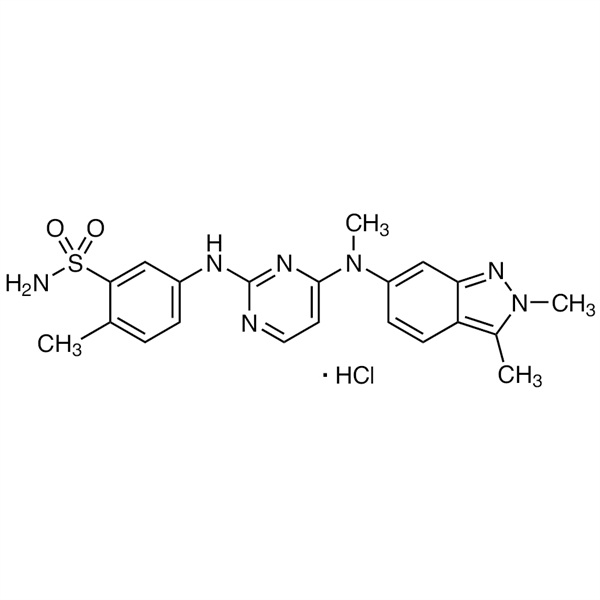Chemical Properties:
Package: Bottle, Aluminum foil bag, Cardboard drum, 25kg/Drum, or according to customer's requirement. Storage Condition: Store in sealed containers at cool and dry place; Protect from light, moisture and pest infestation.Manufacturer Supply with High Purity and Stable Quality Chemical Name: Pazopanib Hydrochloride CAS: 635702-64-6 Tyrosine kinase receptor inhibitor for the treatment advanced renal cell carcinoma or advanced soft tissue sarcoma who have received prior chemotherapy. API High Quality, Commercial Production| Item | Specifications |
| Appearance | White to Slightly Yellow Powder |
| Identification | The infraed absorption spectrum of the test sample is concordant with that of the standard |
| Residue on Ignition | ≤0.50% |
| Any Individual Impurity | ≤0.30% |
| Total Impurities | ≤1.50% |
| Heavy Metals | ≤10ppm |
| Purity / Analysis Method | ≥99.0% (HPLC) |
| Test Standard | Enterprise Standard |
| Usage | API, Tyrosine kinase receptor inhibitor |
Description:
Specifications:
Package & Storage:
| Chemical Name | Pazopanib Hydrochloride |
| Synonyms | Pazopanib HCl; GW786034 HCl; Votrient; 5-[[4-[(2,3-Dimethyl-2H-indazol-6-yl)(methyl)amino]pyrimidin-2-yl]amino]-2-methylbenzenesulfonamide Hydrochloride |
| CAS Number | 635702-64-6 |
| CAT Number | RF-API93 |
| Stock Status | In Stock, Production Scale Up to Hundreds of Kilograms |
| Molecular Formula | C21H23N7O2S.ClH |
| Molecular Weight | 473.987 |
| Solubility | DMSO |
| Melting Point | 300.0~304.0℃ |
| Brand | Ruifu Chemical |
Advantages:
FAQ:
Application:
Pazopanib Hydrochloride (CAS 635702-64-6) is a multi-tyrosine kinase inhibitor of vascular endothelial growth factor receptor (VEGFR)-1, VEGFR-2, VEGFR-3, platelet-derived growth factor receptor (PDGFR)-α and -β, fibroblast growth factor receptor (FGFR)-1 and -3, cytokine receptor (Kit), interleukin-2 receptor-inducible T-cell kinase (Itk), lymphocyte-specific protein tyrosine kinase (Lck), and transmembrane glycoprotein receptor tyrosine kinase (cFms). In vitro, pazopanib inhibited ligand-induced autophosphorylation of VEGFR-2, Kit, and PDGFR-beta receptors. In vivo, pazopanib inhibited VEGF-induced VEGFR-2 phosphorylation in mouse lungs, angiogenesis in a mouse model, and the growth of some human tumor xenografts in mice. It was approved for renal cell carcinoma by the U.S. Food and Drug Administration in 2009 and is marketed under the trade name Votrient by the drug’s manufacturer, GlaxoSmithKline. Votrient is a kinase inhibitor indicated for the treatment of patients with: 1) advanced renal cell carcinoma. 2) advanced soft tissue sarcoma who have received prior chemotherapy.


